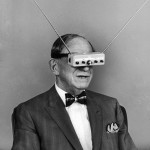When Will You Buy Smart Glasses?
I saw a great presentation last week at a wearable computing conference, by the wearables group at Motorola--a team that’s really focused on building Google Glass-like equipment for industry, rather than consumers.
 Google Glass, Fashion Version
Google Glass, Fashion Version
It was interesting that even at this small industry event, no one in the audience quite agreed on what to call these embryonic devices. Of the two most popular phrases--”head-mounted displays” or “smart glasses”--I think I’ll take the latter. Although now it looks Google is making progress in making “glass” legally it’s own. (Hopefully if Apple introduces a version they can call them i-glasses.)
It made me realize that adoption of smart glasses will probably be a throwback to the patterns of the last century, when commercial applications came first and then the technology migrated to consumers. (Of course, that pattern has been turned on its head this century--employees tend to have better computers and phones in their homes than they do at work.)
It’s pretty clear that the first compelling applications of smart glasses will initially be in areas like public safety (firefighters, for example), equipment maintenance workers, maybe warehouses and logistics--areas where people need detailed and up-to-date information, while keeping their hands free. Because it's such advanced technology, the first really usable smart glasses are going to be expensive, as well.
 Not Google Glass
Not Google Glass
It’s probably going to be a bit like the adoption curve of tablet computers. Twenty years ago, Fujitsu was already making a good business out of tablet computers for specialized purposes like healthcare, inventory and sales.
Then in 2001 Microsoft tried to introduce the Tablet PC more broadly, and it was pretty much only early adopters who bought it. I was one of them. Frankly, it was a bit of pain--you had to use a special pen, for starters--but it certainly got lots of attention from curious passengers on airplanes. All in all, not unlike today’s Google Glass.
Finally, in 2010, touch screens plus better interfaces came along and the tablet was launched--twenty years after Fujitsu started selling them.
I suspect it will be the same with smart glasses--although they will be mainstream far more quickly than the tablet did, thanks to Moore’s Law and our increasingly rapid acceptance of new technology.

